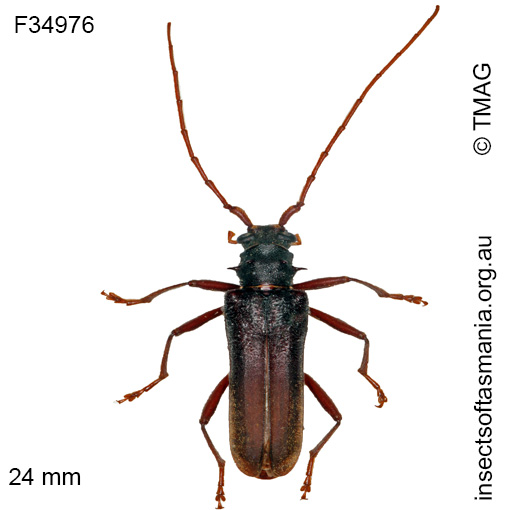
Phlyctaenodes pustulosus
Basis for Tasmanian occurrence
TMAG collections
Classification
Suborder: Polyphaga
Superfamily: Chrysomeloidea
Family: Cerambycidae
Subfamily: Cerambycinae
Tribe: Phlyctaenodini
Morphology
Flightedness: winged and assumed capable of flight
Source literature on morphology and taxonomy (*primary taxonomic source, where identified):
Ślipiński, A. & Escalona, H. (2016). Australian longhorn beetles (Coleoptea: Cerambycidae), Volume 2: Subfamily Cerambycinae. CSIRO publishing, 640 pp.
Ecology
Association with dead wood or old trees: obligately saproxylic
Ecological attributes: — Banksia marginata is a host-plant (Bashford, 1990a) — Eucalyptus amygdalina is a host-plant (Bashford, 1990a) — May occupy logs or trunks of Eucalyptus obliqua, at least temporarily, since found having emerged within six years of felling (Grove et al., 2009).
Collection method(s) for TFIC material: — At light (no trap specified) — At light (with use of light-trap) — Emergence trapping from log of Eucalyptus obliqua — Flight intercept trapping — Hand collection (substrate not specified) — Hand collection from Eucalyptus amygdalina — Hand collection from Eucalyptus globulus — Not specified — Rearing in insectary from Acacia mearnsii — Rearing in insectary from Banksia marginata — Rearing in insectary from Leptospermum lanigerum — Vane trapping.
Source ecological literature:
Bashford, R. (1990a). Tasmanian forest insects and their host plants: records from the Tasmanian Forestry Commission insect collection. Hobart: Tas. Forestry Commission, 32 pages.
Grove, S. et al. (2009). A long-term experimental study of saproxylic beetle … succession in Tasmanian Eucalyptus … logs… In: Fattorini, S. (Ed.), Insect Ecology and Conservation. Research Signpost, pp. 71-114.

